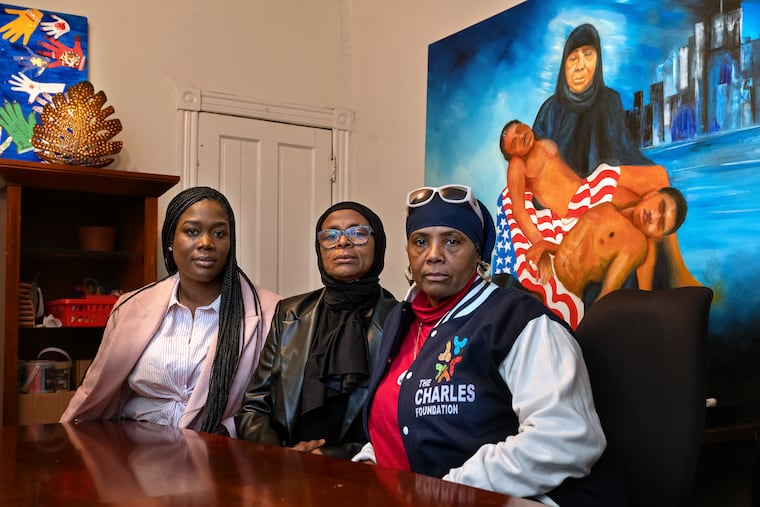Our loved ones were victims of gun violence. Don’t put their names on a T-shirt without our knowledge.
Honoring victims means not being so self-assured about our role as allies that we become careless with their feelings, stories, and right to choose how they want their loved ones to be honored.

Shortly after Philadelphia’s signature day of service to honor Martin Luther King Jr. wrapped up at Girard College in January, Victoria Wylie started getting phone calls from family members of gun violence victims.
They all had the same question: Had she seen the T-shirts?
The shirts, worn by thousands of volunteers who participated in events throughout the region, highlighted gun violence as this year’s focus. It included the names of hundreds of victims of gun violence in the city, including Wylie’s brother, Donte, who was killed in 2008.
Wylie, who started a nonprofit after her brother’s death, hadn’t attended the event and had no idea that her brother’s name was going to be included in what she and other concerned relatives considered to be a form of marketing material. Neither had the family members of other victims who reached out to her.
The family members know that the names of homicide victims are public, and they can’t regulate who uses them. But the issue here isn’t just about permission, it’s about respect and treating families with care, which should be a priority even for those with the best of intentions.
Seeing their loved ones’ names on a product to promote an event without their knowledge, they said, felt invasive and extractive — especially on a day many already felt had been stripped of much of its meaning because of the widespread commercialization of MLK Day.
On behalf of the relatives who reached out to her, Wylie contacted Global Citizen, which puts on the Greater Philadelphia Martin Luther King Day of Service, the largest program in the nation.
In an email and a subsequent Zoom call, Todd Bernstein, president and founder of the nonprofit organization, told Wylie that the names were taken from the Philadelphia Obituary Project, which works closely with family members to document the full lives of city homicide victims. But the project’s Jennifer Lawson, who was on the call, said they were not consulted, either.
No one profited from the shirts, Bernstein said — they were given away for free to volunteers. On the call, he offered a shirt to anyone who wanted one.
The intention behind emblazoning the names on the shirts, he told me, was to raise awareness about gun violence, and to honor those who’ve been lost to it in Philadelphia.
“Like I told him, his intent doesn’t change the impact,” Wylie said of the meeting between Bernstein and concerned survivors. “This is not a club that we want anybody to be part of … but if you are going to be part of this club, understand there are rules and ways to engage — and respect is a core value for us. You’re going to respect us or you can keep your honor.”
We’ve demanded so much of survivors of gun violence — from journalists who ask them to share their stories, to elected officials who invoke their names during campaign season while largely ignoring them the rest of the year, to the police who ask for their patience in a city where barely half of all homicides are solved. Usually, there is little regard for their privacy, or how they are processing their grief. And the expectation often is that they should be nothing if not grateful.
“I’m tired of institutions of power thinking they can tell us what it looks like to be honored, to be Black, to be poor. I’m just sick of it,” Wylie said.
Bernstein eventually offered an apology for using victims’ names without their families’ consent, which he repeated when he and I talked.
“I regret it,” he told me. “I wouldn’t have done it if I had known it would have created this pain.”
The incident raises a lot of issues around allyship.
It also led me to reevaluate my own approach as I sat with a small group of survivors one recent night inside The Charles Foundation community center, founded by Movita Johnson-Harrell to honor the first of her two sons lost to gun violence.
I’ve been in this space for years, writing stories, leading events, publishing lists of homicide victims in an effort to move readers to action. And while I try to contact as many family members as I can before those kinds of stories are published — so as not to cause harm to someone who may need to be prepared to see their loved ones’ names in such a public way — I’m not able to reach everyone.
I shared that with the women, and they assured me that it’s not about contacting every single person, it’s about consistently engaging and centering the very people so many of us want to help.
I hope that’s true. But this should serve as a reminder to all of us who do this work: Honoring victims means not being so self-assured about our role as allies that we become careless with their feelings, their stories, and their right to choose how they want their loved ones to be honored.
If we truly want to help, it’s the least we can do for families who deserve all of the patience, care, and solace that we can muster.
“Our loved ones are not projects,” Wylie said. “They’re people.”